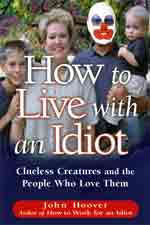How to Live with an Idiot
Amoebas, co-beavers, and slugs…oh, my! If you're thinking of buying How to Live with an Idiot to throw across the room at your spouse, significant other, sibling, child, parent, friend, coffee-counter clerk, co-worker, boss, or anyone else you've determined is too clueless for words please, close the book, put it back on the shelf (face out, if you don't mind), and back away slowly. Dr. John doesn't want to be the author of the first literary assault weapon. If you're hoping to discover a way to live with the significant idiots in your life in a more tolerant and forgiving atmosphere, proceed to the check out line.
Reading this new book could help you accomplish one or more of the following:
- You could emerge with a kinder, gentler attitude toward clueless creatures
- Your kinder, gentler attitude could give the clueless creature(s) in your life incentive and tacit permission to become less clueless
- You could discover that you're a clueless creature who shouldn't be pointing fingers (oops)
- Your new attitude could make you serenely unaffected by cluelessness, no matter where it comes from
Living with idiots is frustrating because clueless creatures don't get it. Idiots haven't a clue, especially when it comes to what makes their partners happy. This brings two questions to mind. Do we really know what makes our significant idiots happy? Does our happiness depend on them? Really depend on them? If you answered, `no' to the first question, the threat level is moderate. We can always learn. If you think your happiness depends on someone else, red lights are flashing and buzzers are going off. The threat level is extreme for a mental health meltdown.
A reviewer described the popularity of Dr. John's How to Work for an Idiot: Survive and Thrive without Killing Your Boss (Career Press 2003) by saying, We all like our medicine to taste good. This pithy observation presumes that we feel the need to take medicine in the first place. Despite an avalanche of pop psychology publishing and mood-management medications, a psychologist's ability to change a light bulb still depends on the light bulb's willingness to change. How willing and eager are we to change?
We can't take other people's medicine for them. It would be nice if we could take the pills, swallow the syrup, do the exercises, join a group, and go to therapy to make them treat us the way we want to be treated. But, we can't. Not directly, anyway. We can take the pills, swallow the syrup, do the exercises, join a group, go to therapy, and make ourselves feel better.
When we feel better, everything feels better. Not perfect, but better. The more okay we are with who we are, the more okay we are with who everybody else is. Why should we do all the work? You don't think the idiots in your life are going to break a sweat to make you fell better, do you?
People have been trying to find a way to change the other people in relationships for as long as eccentric inventors have been trying to invent the perpetual motion machine. No progress to report in either. Sorry. Good news: The medicine in How to Live with an Idiot is intentionally light-hearted, but proven to work, if taken properly. It doesn't taste that bad, either.
Are the significant idiots in your life amoebas, beavers, altruists, garden slugs, jaguars, or whirling vortexes? A little of each? Which category do you fall into Life Fountains or Black Holes? Nobody said that Zen and the Art of Relationship Repair can't be fun and rewarding. How badly do you want to develop a healthier, happier relationship with your spouse, significant other, sibling, child, parent, friend, coffee-counter clerk, co-worker, boss, or person at-large? How to Live with an Idiot: Clueless Creatures and the People Who Love Them could be your opportunity. Enjoy the medicine.
